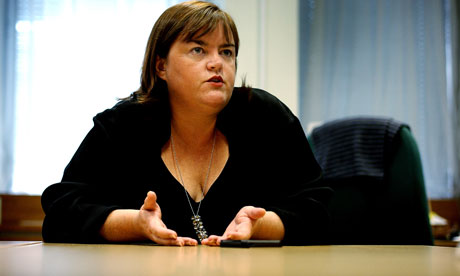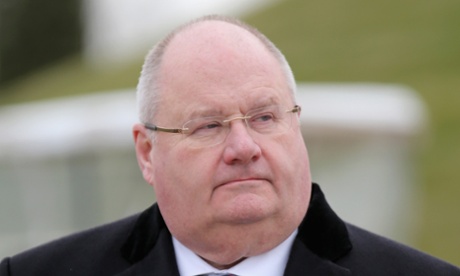Tony Blair's former "respect tsar" Louise Casey, one of Britain's least conventional civil servants, has been appointed to head the government's broad response to the riots, David Cameron has announced.
It is an extraordinary return to the centre of social and criminal policy enforcement for Casey, who is not regarded as a natural ideological soulmate of the Conservatives.
She is to work as a director-general in the Department of Communities and Local Government, where she will lead a new unit overseeing issues raised by the riots, including problem families, school truancy, antisocial behaviour and gangs.
Casey will be the head of a troubled families unit tasked with addressing Britain's 120,000 problem families by the end of the parliament.
She is expected to produce an action plan by November, and has already warned the prime minister that there is a high risk of failure if resources and effort are not dedicated to tackling the issues.
Casey, seen as someone who understands what works in dealing with youth crime and problem estates, has surprisingly won the enthusiastic support of the communities secretary, Eric Pickles.
The importance Cameron attaches to Casey's appointment was underlined by his decision to make the announcement himself at prime minister's questions.
The prime minister said she had been a superb official over the past decade. He said many agencies were working with problem families, including in schools and social services, but "no one was really getting in there", adding that the initiative could make a huge difference and reduce the burden on taxpayers.
Casey also has a strong ally in Sir Jeremy Heywood, the permanent secretary at No 10, who is to succeed Sir Gus O'Donnell as the cabinet secretary in December.
She will also work alongside the home secretary, Theresa May, and the work and pensions secretary, Iain Duncan Smith, who has studied the social issues raised by the riots as the chair of his Centre for Social Justice thinktank.
One of her first tasks will be to ensure that all three departments work together to produce a programme that is tangible but protects the localist agenda the Tories have advocated, and she will also need to find a vocabulary that respects the "big society" agenda.
More practically, Casey will have to assess quickly the extent to which organised gangs were a central force behind the riots. The growing perception is that gangs were less crucial than first thought and issues around parenting, schooling and the youth justice system need greater emphasis.
She will also need to handle the calls for parents of children found breaking the law to lose access to social housing or child benefit. Behind the scenes, there has been a Whitehall battle over whether magistrates courts should be able to dock the benefits of a parent if a child is found guilty of an offence.
Casey is currently the victims' commissioner, and has previously undertaken work from the Cabinet Office on public alienation from the closed world of the criminal justice system.
She has long been an advocate of greater rights for victims and less tolerance of perpetrators of antisocial behaviour, and was also one of the first advocates of intensive, sometimes residential help for the small group of problem families that disproportionately blight estates.
She is outspoken in public in a way very few civil servants match – sometimes landing herself in hot political water – but also appeals to the public in a way that most jargon-ridden civil servants do not.
Her willingness to discuss issues of morality and compassion suggests she has overcome innate Conservative suspicion.
At one point, Casey was seen as a potential Labour peer speaking on Home Office issues in the Lords, so the Conservative decision to embrace her is remarkable.
However, support for her work on the left is patchy. Gordon Brown downgraded her work partly because Brownites thought her approach was too reminiscent of the broken Britain rhetoric of Cameron and misrepresented the state of Britain's youth.
In her first guise in Whitehall, working in the Home Office, she developed the concept of antisocial behaviour orders, a form of civil punishment derided by many as being a badge of honour for young people.
She was then moved to Downing Street to work as a "respect tsar" – a broadening of the antisocial agenda to assess issues such as parenting and problem families.
In the final years of the Labour government, she worked to persuade the Ministry of Justice on the extent to which community punishment was not seen by the public as a credible alternative to prison. She proposed a range of measures to make it more credible, and those measures are now being implemented.
One of her trademarks is her determination to cut through multi-agency bureaucracies so Whitehall and local government work effectively to deliver services and send out the right messages to society.
Local government will have to deliver much of the post-riot agenda assembled by the Conservatives, including on issues such as housing, antisocial behaviour and parenting.









